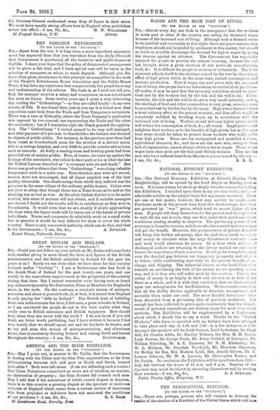THE CARLISLE EXPERIMENT.
ITO THE EDITOR OF THE SPECTATOR.. 1
Snt,—Apart from the war, it is long since a more important announce- ment has appeared than that you reproduce from the Daily Chronicle that Government is purchasing all the breweries and public-houses at Carlisle. I share your hope that the policy of disinterested management will be given a fair trial, and I trust special care will be taken in the selection of managers, on whom so much dependa. Although you. Sir, have often given prominence to this principle ail exemplified in the work of the People's Refreshment House Association and the Public-House Trust, it has been my experience that comparatively few people have any real understanding of the scheme. The basis is, as I need not tell you, that the manager receives a salary and commission on non-intoxicants but none on liquor. Some twelve years ago I spent a very interesting day visiting the " Gothenburgs "—as they are called locally—in my own county of Fife. It was found then, just as you say it is found now, that Opposition came both from the Trade and from Temperance extremists. There was a case at Kirkcaldy, where the Trust Company's application was opposed by two counsel, one representing the Trade and the other the teetotalers ; but if I remember right the Bench granted the applica- tion. The " Gothonburgs " I visited seemed to be very well managed, and after payment of 5 per cent. to shareholders the balance was devoted to objects of public utility. For instance, in the previous year there had been voted at Cowdenbeath sums for the services of a district nurse, /50 to a cottage hospital, and over £100 to provide counter-attractions, such as concerts. At Kelty a reading-room and bowling-green had been provided out of surplus profits. Hero, of course, we come up against the feelings of the extremists, who refuse to have part or lot in what the late Sir Wilfrid Lawson described as "a covenant with sin and death." But there was good evidence that these " Gothenburgs " were doing valuable temperance work in a quiet way. Semi-drunken men were not served, women were not encouraged, and all liquor supplied was of the best quality obtainable. One disadvantage from which they suffered was the presence in the same village of the ordinary public-houses. Critics were not slow to allege that though there was a Trust house at So-and-so the drinking was as bad as ever. As the whole Carlisle district is to be under control, this state of matters will not obtain, and if suitable managers are chosen I doubt not the results will be as satisfactory as they wore in Scandinavia. It would seem that we are steadily if slowly approaching the time when the liquor trade will be taken out of the hands of private individuals. Trusts and companies do admirable work on a small scale, but in practice it would be very difficult for them to cover the whole country. There is only one central authority which can do that, and that


































 Previous page
Previous page